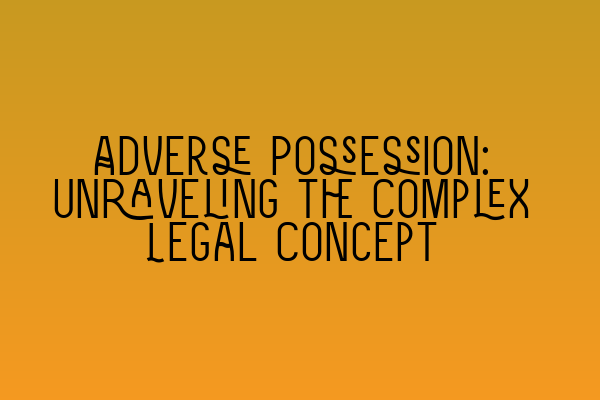Adverse Possession: Unraveling the Complex Legal Concept
When it comes to property law, there are numerous legal concepts and doctrines that can often be confusing and difficult to understand. One such concept is adverse possession. Adverse possession is a legal principle that allows a person to gain ownership of another person’s property, even without having title to the property. This intriguing concept has been the subject of much debate and has left many property owners scratching their heads. In this article, we will unravel the complexity of adverse possession and shed light on its various aspects.
The Basics of Adverse Possession
Adverse possession is based on the idea that if someone openly and notoriously occupies another person’s property for a certain period of time, without the owner’s permission, they can acquire legal ownership of that property. The concept has its roots in the English common law system and has been adopted by many legal jurisdictions around the world, including the United States.
In order to establish adverse possession, certain elements must be met. These elements typically include: (1) actual possession of the property, (2) exclusive possession, (3) continuous possession for a specified period of time, (4) open and notorious possession, and (5) hostile or adverse possession, meaning without the owner’s permission.
The Purpose and Rationale Behind Adverse Possession
The purpose of adverse possession is to encourage the productive use of land and to prevent land from remaining idle or unused. This principle serves as a check against absentee or neglectful landowners and prevents valuable resources from going to waste. By allowing someone who has made improvements and used the land for a significant period of time to acquire legal rights, adverse possession strikes a balance between the interests of property owners and the interests of society as a whole.
However, adverse possession is a complex area of law that raises many questions and concerns. Critics argue that it can lead to unjust outcomes, as it allows someone to take possession of another person’s property without their consent. Moreover, the burden of proof is often on the true owner to prove that adverse possession should not apply, which can be challenging and expensive.
The Role of Time in Adverse Possession
Time is a crucial factor in adverse possession. The length of time required for adverse possession to be established varies depending on the jurisdiction. In some cases, a possession of 5 or 10 years may be sufficient, while in others, the period may be as long as 15 or 20 years. The reason for the lengthy period is to give the true owner ample opportunity to assert their rights and to prevent fraudulent or opportunistic claims.
It’s important to note that the clock starts ticking only when the adverse possessor meets all the required elements of adverse possession. If any of the elements are missing or if the possession is interrupted, the period of adverse possession may be reset.
The Importance of Legal Advice
If you find yourself in a situation where adverse possession may be applicable, it’s crucial to seek legal advice from an experienced property law solicitor. They can guide you through the complexities of the law, help you understand your rights and obligations, and provide the necessary legal representation if the matter goes to court.
At SQE Property Law & Land Law, our team of expert solicitors specialize in property law matters, including adverse possession. We have a deep understanding of the legal principles and can navigate the intricacies of the law to protect your interests. Contact us today to schedule a consultation and learn more about how we can assist you.
Conclusion
In conclusion, adverse possession is a complex legal concept that allows a person to gain ownership of another person’s property through continuous and unauthorized possession. Although this concept aims to strike a balance between the interests of property owners and society as a whole, it raises significant legal and ethical questions. Understanding the basics of adverse possession and seeking legal advice are crucial when dealing with such situations. At SQE Property Law & Land Law, we are here to provide the guidance and expertise you need. Contact us today to learn more.
Related Articles:
- Misrepresentation in Contracts: Unveiling Deceptive Practices
- A Closer Look at SQE Contract Law Syllabus
- SQE Contract Law: Analyzing Landmark Cases and Influential Judicial Decisions
- Understanding Contractual Capacity: Rights and Limitations
- Interactive SQE Mock Tests for Contract Law: Test Your Knowledge
